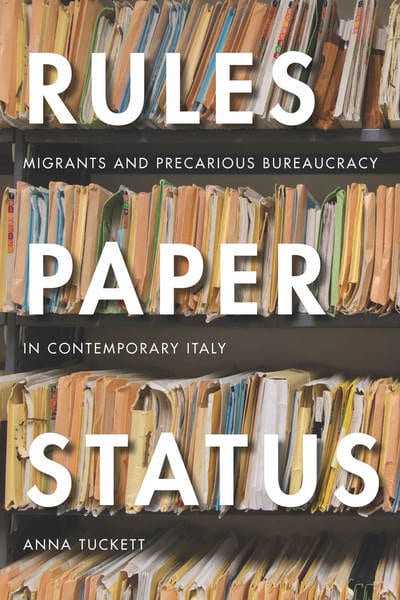The arrival of a ‘refugee,’ ‘migrant,’ ‘asylym seeker,’ or the European ‘Other,’ is too familiar to us from political debates. The stage for this spectacle of ‘crisis’ and ‘emergency’ is often the border — the shores of Southern Europe or the Mediterranean Sea. But what happens when we direct our gaze beyond this ‘immediate moment’? What do we know about the invisible lives of those who are derogatorily defined as immigrato (immigrant) and extracomunitario (non-EU citizens) in Italy?
In Rules, Paper and Status: Migrants and Precarious Bureaucracy in Contemporary Italy, Anna Tuckett examines the intricate relationship between migrants and legal-bureaucratic practices in Italy. By focusing on the sinewy and unstable ties between migrants and their legal status, she offers a rich analysis of legal and bureaucratic practices that shape migrants’ economic and political opportunities as well as their social and cultural life in Italy. Tuckett centres her analysis on what she defines as the ‘documentary regime,’ namely “the nexus of documents, paperwork, and legal and bureaucratic processes that migrants must engage with in their efforts to become and stay ‘legal,’ to bring family members into the country, and to attain citizenship” (4).
Rules, Paper and Status illustrates how uncertainty and opacity are intrinsically part of the documentary regime.
In doing so, it introduces to the reader the labyrinth of laws and bureaucratic practices that govern Italy’s migratory regime by tracing its impact on the life of migrants. By following the trials and tribulations of migrants who navigate the Italian migratory apparatus, the ethnography provides a snapshot of how the tentacles of the documentary regime reach into migrants’ everyday life. The book therefore insightfully illustrates how the ambiguous modalities used for governing migrants produce multiple and contradictory forms of inclusion and exclusion.
Rules, Paper and Status offers two main contributions that help us to make better sense of the migratory phenomenon in Italy. First, it shakes up the limitations of “the deterministic modes of subjectification and governmentality found in Foucauldian-influenced anthropological accounts” (18-19). It does so by zooming into the various forms of affect that the loss and retrieval of legal status can generate. Secondly, it shows that the categories of legal and illegal are unstable by demonstrating how the continuum between migrants’ legality and illegality is at the heart of the Italian documentary regime.
Tuckett captures the multiple layers that constitute the continuity between migrants’ illegality and legality through an in-depth scrutiny of the bureaucratic procedures required for completing legal applications such as residency visa and family reunification.
Taking us into this ‘bureaucratic journey’ and its hurdles, the book demonstrates how the process itself creates a legal limbo during which the migrant is neither legal nor illegal.
Not only does the bureaucratic procedures produce a “temporary outcome” in which migrant’s legal status is in suspension, but also the process itself is saturated with this blurring between the lines of legal and illegal, as the procedure itself can be ‘made up’ by semi-legal practices and authentically fake paper trails. Instead of exclusively centring the analysis on the state response to migratory phenomena, the book elucidates the significance of il Sistema paese (the system of the country), an expression used by migrants and citizens alike to describe the Italian state. It focuses on the symbiosis between migrants and citizens by looking at how they construct (and deal with) the Italian state, especially its paradoxes and inconsistencies.
Successful navigation of the documentation regime does not only hinge on access to money and social networks but also on a know-how of the unspoken rules governing the manipulation of the law. As the undecided character of the law is tamed by the practice of rule-bending, Rules, Paper and Status offers a portrait of Italian bureaucrats, migrants and social brokers’ involvement in manipulating the official rules as the central logic to deal with the Italian state.
The tension between the law and its application demonstrates how migrants’ legality is manufactured not exclusively by legal and bureaucratic procedures, but also by economic, cultural and social capital.
Thus, the production of the legal status (i.e. legality and illegality) is partially dislocated from the legal and bureaucratic milieu as it traverses the social world inhabited by migrants in Italy.
 This thorough scrutiny of migrants’ encounters with the documentary regime lays bare the paradoxical effects produced by Italian bureaucracy’s modus operandi. Tuckett observes how “the process of migrants’ subject-making is [more] informal, accidental, and a product of their own encounters with bureaucratic institutions, in which they learn the best way to make the system work for them” (74). Importantly, it is through this process that migrants become cultural citizens as they employ the same practices and discourses as Italian citizens to deal with the corrupt and inefficient state. Nevertheless, this process of ‘becoming included’ as a cultural citizen is also an unfinished process. Indeed, as Tuckett demonstrates, the quintessence of cultural citizenship could also entail exclusion from legal citizenship.
This thorough scrutiny of migrants’ encounters with the documentary regime lays bare the paradoxical effects produced by Italian bureaucracy’s modus operandi. Tuckett observes how “the process of migrants’ subject-making is [more] informal, accidental, and a product of their own encounters with bureaucratic institutions, in which they learn the best way to make the system work for them” (74). Importantly, it is through this process that migrants become cultural citizens as they employ the same practices and discourses as Italian citizens to deal with the corrupt and inefficient state. Nevertheless, this process of ‘becoming included’ as a cultural citizen is also an unfinished process. Indeed, as Tuckett demonstrates, the quintessence of cultural citizenship could also entail exclusion from legal citizenship.
Tuckett unearths the limitations of the ‘documentary regime’s’ malleability as “the institutionalization of illegality, precarity, and exclusion within the immigration law [which] remained unchallenged.” (69). These limitations limpidly emerge in the portrait of the so-called 1.5 and second generation. Their struggle echoes the tension between cultural and social belonging in Italy and the citizenship law that is based on jus sanguinis (right of blood). This intimate aspect of migrants’ life is well recounted in Rules, Paper and Status: the racialised understanding of citizenship promulgated by the Italian law and cultivated by an increasing number of Italians.
Rules, Paper and Status provides a timely contribution to the study of migration, late capitalism and the anthropology of the state.
Tuckett interprets the historical configuration of the documentary regime as an inherent feature of Italy ‘as a nation-state’ emphasising how the Italian state’s modality of governing migration echoes state-citizens relations. Thus, the monograph shows how the legal and bureaucratic architecture governing migration in Italy is ambiguous, undefined and distant from the global deportation regime described by De Genova and Peutz (2010). Yet, this work also introduces to the reader a new paradigm of the legal ambiguities described earlier by Reeves (2015) in her work on Russian labour migration regime in which the migrant is neither deportable nor legally recognised. Indeed, illegality is not necessarily translated into deportability and the boundary between legality and illegality is (almost always) renegotiable. This ambiguity endangers migrants’ possibility to obtain legal citizenship and produces a precarious legal condition, which is also passed on to new generations.
Similarly to Miriam Ticktin’s Casualties of Care: Immigration and the Politics of Humanitarianism in France, the book unpacks the thickness and longevity of anti-migration sentiments in Italy. The attention to the different layers that ‘make up’ the Italian state’s treatment of migrants and its historical genealogy is crucial to capture the importance of cultural and social capital for the functioning of the legal apparatus. We learn how these layers are enmeshed with migrant’s poverty. At the same time, we read how prevailing ideas about racialized citizenship confine migrants to a position of second class citizens.
By dissecting the different dimensions producing migrants’ exclusion, Tuckett’s Rules, Paper and Status provides a crucial contribution to theorizing about citizenship in European countries and the hegemonic discourse of integration. By excavating the past and tracing its reverberations into the present, Tuckett provides us a new lens through which we can better understand the current events occurring in Italy. They cannot be reduced to the ‘recent’ rise of populism.
References
De Genova, Nicholas. and Peutz, Nathalie (eds.). 2010. The Deportation Regime. Sovereignty, Space and the Freedom of Movement. Durham: Duke University Press.
Reeves, Madelene. 2015. “Living from the Nerves. Deportability, Indeterminacy, and the ‘Feel of Law’ in Migrant Moscow”, Social Analysis 59(4), pp. 119-136.
Ticktin, Miriam. 2011. Casualties of Care. Immigration and the Politics of Humanitarianism in France. Berkeley/Los Angeles/London: University of California Press.
Featured image by Thomas Hawk (flickr, CC BY-NC 2.0)



